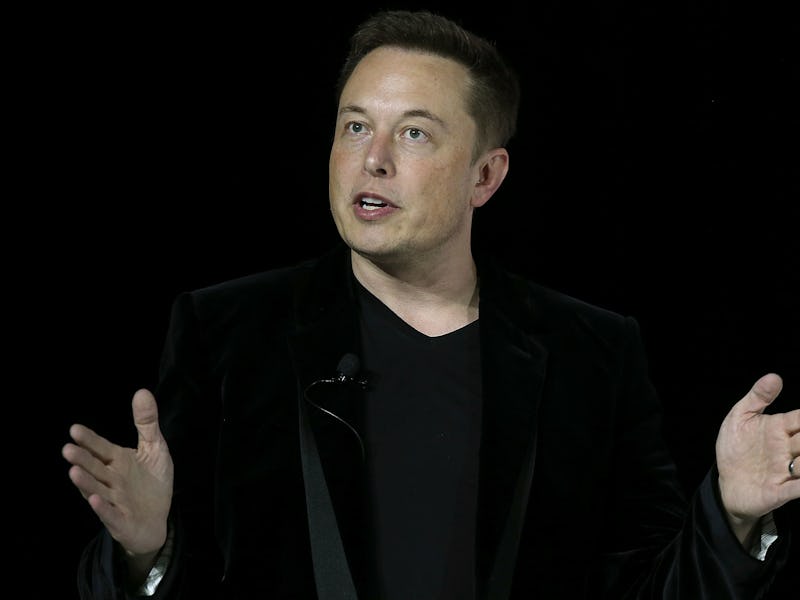Elon Musk: "Do Not Bet Against" Tesla's Self-Driving Tech
A question about autonomous cars moved the CEO make a claim.

On Wednesday, during a conference call to discuss Tesla’s third-quarter financial performance, CEO Elon Musk threw down the gauntlet.
“There are obviously skeptics out there,” he said. “I suggest that they do not bet against us.”
The skeptics to which he refers would either say that the hardware and software suite on Teslas are not actually capable of full autonomy, or, alternatively, that full autonomy is unreliable. Musk has long touted the safety benefits of Tesla Autopilot. But full autonomy is a different beast, one that likely will eliminate car wrecks as we know them.
The investor challenged Musk, asserting that Tesla was “de-emphasizing the vision approach to aid us in autonomous driving, and now it seems that the latest hardware seems largely based on vision.” Musk was quick to clear up any confusion. He responded:
First of all, I would separate what Tesla says from, say, some supplier of ours issuing bullshit. OK? The blog that I wrote was very clear that radar is moving from a supplemental to also a primary sensor. It’s not to the exclusion of vision, but it’s also a primary sensor. Vision is still the main thing, but radar, instead of merely being like a cross-check against vision, is really, when done well — and we’re very confident at this point that it can be done this way — can be a primary sensor, such that you can take actions based on radar information alone. You can also take actions based on just vision alone. Much as a person might take action based on whether you hear something or you see something, but you don’t need to both hear it and see it.
Tesla claims that the latest hardware, which will be incorporated into all Teslas from now on — the Model 3 included — is sufficient for full autonomy. The system leverages multiple cameras (the “eyes” for Tesla vision), an advanced radar system, and what is in effect, a supercomputer, all of which enable the car to drive itself. Musk hopes to get a Tesla from Los Angeles to New York City all on its own by the end of next year.
“We feel highly confident that the eight-camera solution, with twelve ultrasonics and a forward radar, and the computing power that we now have on-board, is capable of full autonomy,” Musk said.
Another questioner, later in the discussion, asked Musk when Tesla’s data would suffice to sway regulators to support autonomous cars wholeheartedly. He responded that Tesla works with the National Highway Traffic Safety Administration (NHTSA), and other regulatory agencies around the world, “very closely on a daily basis,” and that Tesla has done so for a long time and “at a very detailed level.” Semi-autonomous (Autopilot-equipped) Teslas already demonstrate a “significant improvement in safety,” Musk said. “What’s sort of less visible to the outside are all the cases where version one of Autopilot actually did a lot to mitigate the accident, so that the impact velocity went from being potentially fatal or severe injury to customer stepped out and walked away.” These statistics are far more informative than fatalities, he said, because “fatalities are extremely rare.”
The inside of a Tesla.
For Tesla to reach a “statistically significant conclusion on fatalities,” its cars will need to travel a minimum of a billion miles, Musk said.
That day will come sooner than later. As more and more Teslas appear on the roads, the miles rack up faster and faster. Musk said he thinks Autopilot is driving “almost a million and a half miles per day,” and doing so “in all kinds of road conditions, and weather, throughout the world.” Regulators will be forced to notice: “The more time that goes by, the more miles that we accumulate, the stronger the argument gets about the confidence interval, and it becomes clearer and clearer. So, I’m really quite optimistic about where things are, and where they’re headed on that front. I think they’re headed to a good place.”
Relative to previous investor calls, this was a happy affair; Tesla, for the first time in over three years, ran a profit. Musk called it the “best quarter ever,” and “one of the best moments ever in Tesla.” Granted, he was speaking to investors and reporters listening in, and probably more than a few curious investors and customers, but it’s true that the automotive industry’s underdog is at last giving the big players a run for their money. Achieving full autonomy before anyone else would certainly give Tesla the upper hand, and those who doubt that Tesla is capable of doing so — in Musk’s mind — are not reliable gamblers.